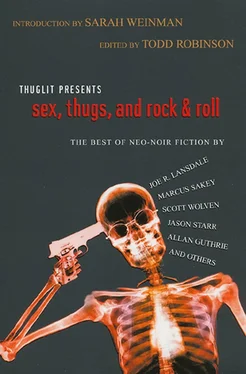He said, “If anybody hassles you, call 911 and give the officers my card as soon as they get here, okay?”
After a few seconds, Janet picked the card up, slipping it into the pocket of her apron.
Gurevich pointed to a tray of crullers in the display case and said, “These look good. What d’you call them?”
“Dharma Doughnuts,” she said. “You want one?”
“Sure, that’d be nice,” Gurevich said.
Janet picked up a donut with a pair of tongs, wrapped it in wax paper, and said, “Eighty-five cents.”
Annie was carrying the conversational load tonight, chattering away about fourth grade politics. Kay’s strained silence during dinner told Gurevich something was worrying her.
She sat with her eyes down, picking at her food. Gurevich couldn’t tell if she was fretting about finances or fuming about something he’d done. Marital telepathy warned him that whatever it was, Kay didn’t want him to mention it in front of Annie.
Annie finished eating and went into the living room to watch TV. Gurevich helped Kay clear the table.
When they were alone in the kitchen, Kay took a letter out of her purse and handed it to him. He went over to the island and read it under the overhead light. It was a parental alert on the letterhead of the Los Angeles Unified School District’s School Police.
A man with a telephoto-lens camera had been spotted taking pictures of kids on the playground at Annie’s school. School police officers had attempted to detain and question the guy, but he escaped on a ten-speed bike.
The unknown suspect was late middle-aged, Caucasian, medium height and weight with bushy eyebrows, wearing white pants and a dark blue sweatshirt.
Gurevich’s throat tightened up.
He pictured Lencheski gliding up to his daughter on his bike as she walked home, gaining her trust, offering her one of his doped-up fountain drinks.
Still darker images from his days as a sheriff’s deputy came back to him, memories of cadaver dogs and methane probes, of explorer scouts and police academy cadets grid-searching a brushy hillside, one of the dog handlers calling out as he spotted a backpack under some leaves-Jesus-and then the first heart-stopping glimpse of those little white legs…
Kay said, “I hoped you’d know who to call about this.”
Gurevich refolded the letter and stuffed it back into its envelope. He stepped over to the refrigerator and poured himself some milk.
He felt her eyes on his back and took a few seconds before he answered her.
He sipped some milk and said mildly, “Don’t worry about it, babe. I’ll take care of it tomorrow after work.”
Kay said, “Oh, Bill, that’ll be great.”
Lencheski stood at the foot of the cul-de-sac on his ten-speed, scanning the shadows for potential ambushers.
The demonstrators were gone.
He glided down the street as quietly as he could. He dismounted the bike and stood on the sidewalk in front of the bungalow court with the rubber-coated security chain in his hands, watching and listening.
There was no foot traffic, no one lurking in a parked car. He detached the front wheel and padlocked the ten-speed’s frame to a light pole.
He started to relax as he approached his bungalow, the bike’s front wheel on his shoulder.
His front door opened from the inside and the light over the stoop flicked on. Lencheski braced for an attack.
“Getting in a little late, aren’t you, Richard?” Gurevich said. “What have you been up to this evening?”
“Racking up some overtime,” Lencheski said, relieved. “We had a rush order on a wedding cake.”
Gurevich stepped aside. Lencheski entered the bungalow. The place had been tossed, furniture overturned, all his stuff strewn around.
“Did somebody break in here?” Lencheski said.
“Yeah, me,” Gurevich said. “These crappy locks of yours, all I needed was a credit card. Probably don’t see many of those in this neighborhood, though. Don’t you have anything worth stealing here, Richard?”
“Just my bike and my TV is all.”
“What about a camera? Maybe with a telephoto lens?”
“What’s this about, Mr. Gurevich? What are you looking for?”
“We’ll talk after I finish my inspection.”
Gurevich walked into the bedroom.
Lencheski followed him and watched him yank the dresser drawers out, dumping their contents on the floor.
Gurevich kicked apart the jumble of T-shirts, socks, and shorts with his shoe. He turned his attention to the closet, rattling wire hangers as he pulled pants and coat pockets inside out.
Lencheski said, “Like I said before, I don’t keep any contraband here, Mr. Gurevich.”
“Keep your mouth shut until I tell you different,” Gurevich said. The camera is probably in his locker at the bakery , he thought. If I find it, he’s going back inside on the next bus .
He looked at the bowl-shaped piece of frosted glass that shielded the overhead lightbulbs. There was a dark rectangular shadow behind it.
Gurevich dragged a chair over and stood on it, retrieving the hidden object. A moment later he stepped back down, staring at the bottle of terpin hydrate and codeine elixir in his hand.
“I never saw that before,” Lencheski said.
Gurevich slipped the codeine into his pocket. He grabbed Lencheski by the collar and punched him under the heart. Lencheski cawed in distress and jackknifed forward.
Gurevich took hold of Lencheski’s greasy hair, yanked him upright, and said, “What’d I tell you about talking?”
Lencheski struggled to reinflate his lungs, his eyes and nose streaming. Gurevich shoved him into the nearest corner and resumed his search.
He flipped Lencheski’s stained mattress off its metal frame.
There was a pink pastry box from Dharma Buns under the bed. Gurevich opened the box and looked inside.
It was a cake with white butter frosting, its top bearing a photo-realistic image of a little redheaded girl on a playground swing set. Her denim skirt was billowing high on her thighs, her legs akimbo.
Her feet and ankles had been partially eaten away. The tines of a fork had scored deep gouges into her abdomen.
It was a likeness of nine-year-old Annie Gurevich, a candid shot taken during recess at her school.
Gurevich came into the office a half hour late the next day and told Tasha to reschedule all his interviews.
He closed the door to his cubicle and booted up his computer. When the California Department of Justice site came up, he launched the appropriate application and typed in Richard Lencheski’s parole number and the code number of his electronic surveillance anklet.
Seconds later a map of Hollywood and West Los Angeles appeared on his monitor. The map showed a series of yellow dots superimposed on a grid of city streets, along with a time code. Annie’s school was at the terminus of the dots.
Gurevich was still staring at the electronic map overlay five minutes later when Tasha transferred a call from the West L.A. Sheriff’s homicide dicks.
Gurevich took the call, listened for a moment, and said, “Yeah, he’s one of mine, all right.”
He checked out a Chevy and drove to Lencheski’s bungalow. When he arrived at the cul-de-sac, Sheila Halpert and her supporters were nowhere to be seen.
Today’s crowd consisted of two sheriff’s radio cars, an SUV from the Scientific Investigations Unit, and a white panel van from the medical examiner’s office.
Gurevich showed his credentials to the scene control officer and signed the log. He ducked under the yellow police line tape, and went into Lencheski’s bungalow.
He followed the sound of voices into the bedroom. Two sheriff’s detectives were standing over Lencheski’s corpse.
Читать дальше












